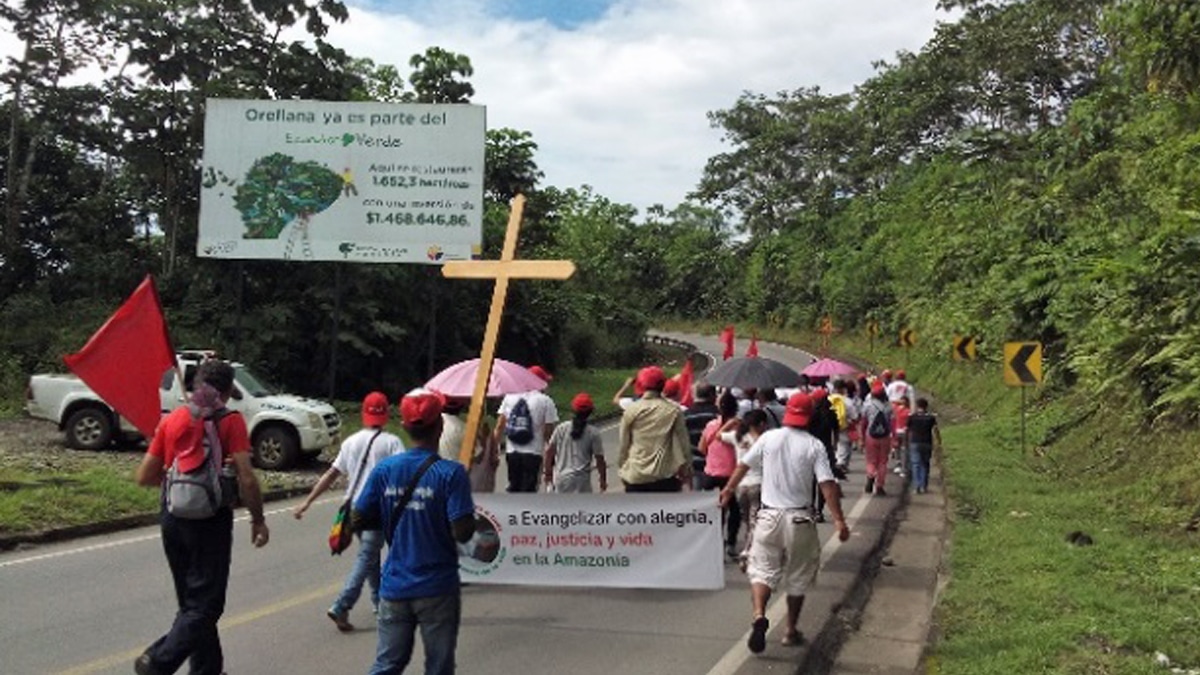
Fr Darwin Orozco, OFM Capucin
Coordinator of the JPIC Commission
at the Conference of Religious of Ecuador
Mother Earth Dear Earth, you are my mother, you saw me born and raised in Chocó Andino, in Nanegalito, where in the ancestral culture the Yumbos I had to live in harmony with creation. Thank you for a wonderful land dressed in flowers and woven with silver threads, for its countless waterfalls, with abundant flora and fauna unique in the world. Clotilde, also my dear mother, you were particularly passionate about orchids, thank you for teaching us to love and take care of creation. I remember each of your children had one or two meters of land in front of the house to grow roses, dahlias, carnations, geraniums or other ornamental and medicinal plants, it was our first school, thank you very much!
It makes me happy to see Jesus of Nazareth feeding the hungry, healing the sick and seeing how the water, the wind and the sea obey him. It fascinates me that Jesus takes elements of nature to explain who he is, he says “I am”: real life, living bread, living water, the door, the light of the world, the way. I feel identified with Jesus’ mission “Go into the world, proclaim the Good News to all creation.”
Taking care of the earth and good relationships is present in the Word of God. I always like to believe that we are creatures of God, made in his image and likeness, that the Creator has given us his spirit to take care of and cultivate the earth (cf. Gen 2:15). We must re-imagine the earth as God dreamed it.
Pope Francis asks us to listen to the moan of the earth and the cry of the poor, he tells us that the crisis we are going through is socio-environmental. With the encyclical Laudato Si ‘, he invites us to contemplate “What happens to our house”, and demands from us the commitment to water, warns against the loss of biodiversity, the deterioration of the quality of human life and social degradation. He also denounces planetary inequality and the weakness of reactions. In the third chapter, he invites us to go to “the human root of the ecological crisis” and encourages us to live an integral ecology to ensure a worthy land for future generations. The Pope urges us to “… accept the challenge of dreaming and thinking about another humanity. We can aspire to a planet that provides land, shelter and work for all.”
The Earth Charter was born in 1987 within the United Nations World Commission for Environment and Development. It is made up of 16 fundamental principles for sustainable development.
We are called to think and act more and more from integral ecology in the spirit of Laudato Si “. Will we make our “Laudato Si Objectives” (OLS) which are a response to the cry of the earth, to the cry of the most vulnerable, and to making choices for an ecological economy, education and spirituality? There is an urgent need to adopt simple lifestyles emphasizing community engagement. Active participation in the care of creation at local, regional, national and international levels is essential.
We can translate this care of the earth into action from small gestures, but which are great contributions to the planet. Among these are the use of clean alternative energies, the installation of water-efficient taps and toilets, the collection of rainwater, the reuse of water inside houses… recycling (waste, batteries, plastics, bottles, cans) is a vital and almost inevitable task and one of the most important actions in taking care of the earth. Compost bins are a great option to avoid generating polluting organic waste and to obtain compost for plants. We can also think of the consumption of healthy foods, if possible cultivated by oneself, the recovery of indigenous or native seeds to maintain the biodiversity of the foods available to each community and territory, the exchange of seeds (barriers). All of this, along with the purchase of local products, which do not involve massive transfers with their corresponding consumption of fossil fuels, helps take care of the earth. In the process of restoration or reforestation of forests, let us think about using native trees.
We learn and we must strengthen the collaboration with ecclesial and civil organizations that take care of the common house, I only mention a few: CÁRITAS, the World Catholic Climate Movement (MCMC), Red Iglesias y Minería and REPAM.